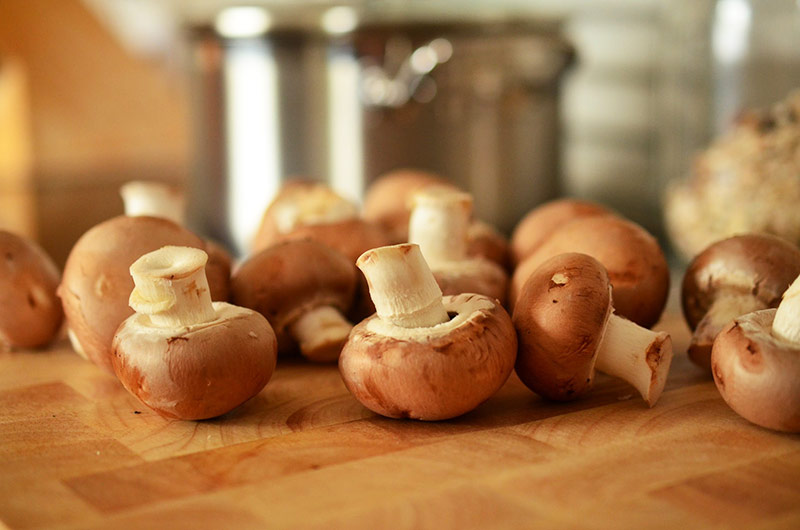You want to know more about vitamin D? Then you are exactly right here. I would like to give you everything you need to know about the important sun vitamin. From a clear profile, about type, function, daily requirement, overdose and deficiency, to food and supplements. In addition, you will learn what vegans and vegetarians need to consider.
Here is in advance a short Overview for you:
Notice: This article is not a substitute for medical advice, but provides general information about vitamin D only. Please consult your doctor if you feel unwell or want to prevent health problems with medical care.
Vitamin D PROFILE at a glance
Assignment: Group of fat-soluble vitamins that belong to the secosteroids
Synonyms: Sun vitamin, vitamin D3, calcitriol
Important for: Calcium absorption, bone structure, immune system
Daily requirement: 20 micrograms per day from the first year of life₁.
Recording: through food intake and sun exposure
Overdose: possible by taking high doses of vitamin D supplements
Deficiency symptoms: including fatigue, hair loss, mood swings
Food: Mushrooms, chanterelles and as an additive in margarine.
Nutritional supplement: As drops, powder, capsule or tablet
How can you absorb vitamin D?
Vitamin D is a very special vitamin because it is produced both by the Food recorded, but also by the Influence of sun exposure on the skin can be produced by the body itself. We humans cover around 10-20 percent of our daily vitamin D requirement through our diet. 80-90 percent with the help of sunlight.₂ For this, however, it is important to eat more frequently. being outside in nature and to leave the face, hands, legs and arms uncovered as far as possible.
What is the daily requirement of vitamin D?
In principle, the daily requirement of vitamin D covered by the regular stay in the sun be made. If this is not guaranteed, the German Nutrition Society (DGE) taking a vitamin D supplement.
According to the DGE, the daily requirement is 20 micrograms from the first year of life. A daily dose of 10 micrograms is recommended for infants under 12 months of age.₃ The desirable blood concentration of the marker 25-hydroxyvitamin D is 50 nanomoles per liter.₄
What is the importance and function of vitamin D in the body?

Vitamin D has a great importance for our health. It supports the absorption of calcium and phosphate from the intestines and transports these nutrients to the bones. In addition, the sun vitamin is important for the Protein formation, the Control of many genes and the Promotion of metabolic processes Studies have also established links between vitamin D supply and high blood pressure, type 2 diabetes mellitus, and cardiovascular and cancer diseases.
The functions of vitamin D briefly summarized:
- Promotes calcium and phosphate balance
- Supports bone formation
- May prevent cancer
- Important for a healthy immune system
- May prevent high blood pressure or type 1 diabetes
Is an overdose with vitamin D possible?
Exposure of the skin to sunlight does not cause an oversupply of vitamin D in the body. This is also not to be expected via the diet, apart from the excessive consumption of foods with added vitamin D. However, acute vitamin D poisoning can occur if large amounts of high-dose vitamin D supplements are taken in a short period of time. This is the case because our body cannot excrete excess amounts of the fat-soluble vitamin. Chronic vitamin D intoxication can occur if you supply your body with more vitamin D than it needs over a long period of time. Symptoms include kidney damage, increased urination, and the feeling of weakness.₆
When does a deficiency occur?
The valuable vitamin is especially lacking when, when we spend too little time in the sun. Diseases, such as chronic inflammatory bowel diseases, can also inhibit the absorption and utilization of the vitamin and cause a deficiency.₇.
A typical consequence is then the disturbance of bone metabolism and the associated demineralization of the bones. How likely a deficiency is, however, also depends primarily on factors such as Residence, Season, Time of day, Body weight and Age ab.₈
Deficiency more common in: housebound people, seniors, vegans, people with dark skin.
What foods contain vitamin D?

Even though our body produces the sun vitamin primarily through exposure to sunlight, there are definitely some plant foods₉ that contain the valuable vitamin. Here is an overview:
- Mushrooms (1,90 μg per 100 gram)
- Chanterelles (2.10 μg per 100 grams)
- Porcini mushrooms (3.1 μg per 100 gram)
- Shitaki (2 μg per 100 gram)
- Margarine (as a supplement, 2.5 - 7.5 μg per 100 grams)
Notice: Especially herring, salmon and chicken egg yolk are rich in vitamin D. This is mainly because chickens, for example, produce the vitamin through exposure to sunlight.₁₀ However, since I want to live a life without cruelty to animals prefer and get sufficient amounts of vitamin D even without them, I avoid these foods.
What do vegans and vegetarians have to consider regarding vitamin D?
The DGE considers vitamin D a critical nutrient not only in vegans, but also in the general population. But because vitamin D sources are quite limited in the plant-based diet, vegans are advised to take nutritional supplements especially in the winter months when there is little sunshine.₁₁ Also a Regular blood test at the family doctor is generally highly recommended in order to get to know one's own body better.
How does the supplementation with the sun vitamin work?
When you Vitamin D supplements you would like to take, you should Coordinate nutritional supplementation with your primary care physicianin order to avoid an overdose. If a supplement is useful, then the following preparations in drop or capsule form are recommended.
- Drops: you get here*
- Capsules: you get here*
FAQ: The most frequently asked questions about vitamin D
What foods are rich in vitamin D?
Quantities of vitamin D that meet requirements are hardly found in food, which is why dietary supplementation makes sense. You can find small amounts in mushrooms and processed foods with added vitamin D (e.g. margarine).
Is it possible to absorb vitamin D in the shade?
No, for the formation of vitamin D you need direct sunlight. However, to check if the sun is coming in at the right angle, you can look at your shadow: It should be shorter than your actual height.
Is vitamin D good for the skin?
Yes, vitamin D helps to renew the skin and is also said to help with skin diseases such as psoriasis or neurodermatitis.
Is vitamin D a hormone?
Yes, vitamin D is basically a hormone. Strictly speaking, it is a prohormone that is converted by the body into the steroid hormone calcitriol.
Is vitamin D water-soluble or fat-soluble?
Vitamin D, which is also called the sun vitamin, belongs to the fat-soluble vitamins. Vitamins A, E and K also belong to the fat-soluble vitamins.
Ensure supply of vitamin D
Whether you're vegan or not, spend time outdoors regularly, and dress regularly so that the sun's rays reach your skin. Eat a balanced diet and have regular blood tests with your family doctor. In case of need, supplement your diet with vitamin supplements. In this way, you can specifically prevent a vitamin D deficiency.
Do you have any questions or suggestions about this post on the sun vitamin? Then feel free to write me a comment.
Stay healthy,

PS.: You want to know, why i live vegan? In the linked article I give you my reasons.
References:
₁,₃ Deutsche Gesellschaft für Ernährung e. V.: Vitamin D (Calciferole), https://www.dge.de/wissenschaft/referenzwerte/vitamin-d. [05.05.2021].
₂ S. Kelm: Vitamin D (as of 07/24/2018), https://www.apotheken-umschau.de/mein-koerper/haut-und-haare/vitamin-d-711907.html. [05.05.2021].
₄,₈,₉ German Nutrition Society: Selected Questions and Answers on Vitamin D, https://www.dge.de/wissenschaft/weitere-publikationen/faqs/vitamin-d. [05.05.2021].
₅ Robert Koch Institute: What is vitamin D and what functions does it have in the body? (as of Jan. 25, 2019), https://www.rki.de/SharedDocs/FAQ/Vitamin_D/FAQ01.html
₆ M. Feichter: Vitamin D - Overdose (Accessed 03 Oct. 2019), https://www.netdoktor.de/ernaehrung/vitamin-d/ueberdosierung. [05.05.2021].
₇ C. Felchner; M. Feichter: Vitamin D - Deficiency (Accessed 03 Oct. 2019), https://www.netdoktor.de/ernaehrung/vitamin-d/mangel. [05.05.2021].
₁₀ Federal Ministry of Education and Research: Easter eggs - More vitamin D thanks to sunlight (as of 27.03.2018), https://www.bmbf.de/de/ostereier-mehr-vitamin-d-dank-sonnenlicht-5914.html. [05.05.2021].
₁₁ German Nutrition Society. (DGE, 2016): DGE Position "Vegan Nutrition," https://t1p.de/1uw2, p.95.





